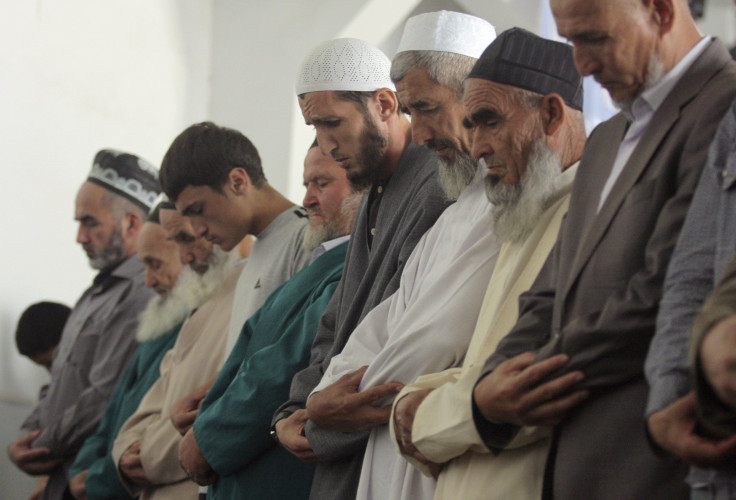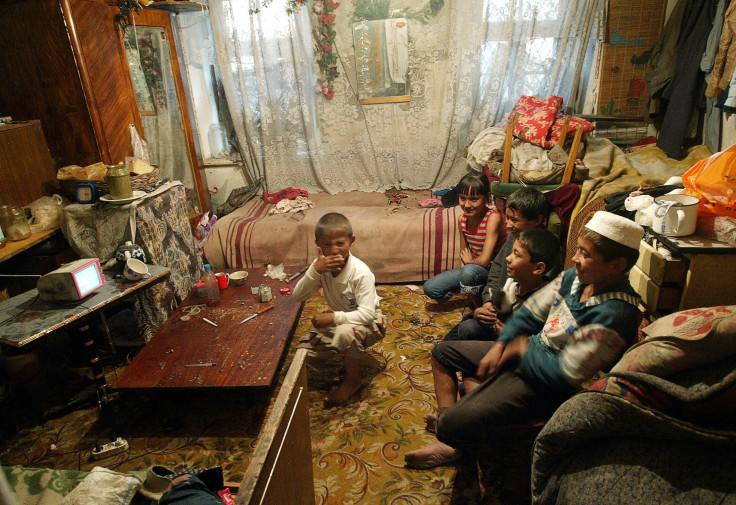How Central Asian US Allies Are Using ISIS To Crack Down On Dissent, Get Funding

Aramais Avakian, a carp farmer of Armenian descent, was traveling with four of his friends through the mountainous northeastern region of Uzbekistan when masked officers pulled their car over, forced them out and hooded them. Hours later, they were being tortured in prison by government agents who wanted to push them into signing false confessions of engaging in extremist activities, Amnesty International reported.
Avakian, who has maintained his innocence, was brought into a courtroom last month on a stretcher. His hands were bruised, he had noticeably suffered weight loss and there were reports he may have been given electric shocks. Some of the case revolved around the length of his beard, which investigators argued was a mark of Islamic extremism. After just an hourlong final hearing, a judge found him guilty of plotting anti-constitutional activities, participating in a religious extremist organization and various other sedition charges. He was sentenced to seven years.
But there’s one factor that had observers scratching their heads: Avakian — allegedly a sympathizer of the Islamic State group in Syria — is not even a Muslim. His relatives, who belong to the Armenian Christian minority, say he has no connection to ISIS and was targeted because officials wanted his land.
"There's a very strong consensus it's a politically motivated case," said Steve Swerdlow, a Kyrgyzstan-based Central Asia researcher for Human Rights Watch, a global human rights organization.
Governments across a largely autocratic Central Asia are increasingly pinning Islamic extremist allegations against helpless citizenry as well as political opponents to push forward trumped-up and far-fetched charges, human rights activists said. Taking advantage of a heightened global push to counter extremist recruitment, governments are finding more than just a shield against accusations of human rights abuses — they’re also finding fertile financial support. Last month, the White House announced plans to boost military aid by $50 million to help governments in the region take on purported terror threats.
Armenian Minority in Uzbekistan #AramaisAvakian arrested since September as #ISIS https://t.co/Z7GWjt3n47 via @RFERL
— Вячеслав Лавринов (@poetVecheslaff) January 8, 2016
"His experience is quite typical," Swerdlow said of Avakian's arrest. "Whether it's business people that are successful entrepreneurially and pose some sort of threat in an economic sense, or it's actual journalists, human rights defenders, the state basically governs the country using these politically motivated prosecutions."
The State Department has said it’s monitoring the situation in the former Soviet region, which is wedged between China, Russia, Iran and Afghanistan. "We are cognizant of the possibility of countries overreaching in the fight against violent extremism in ways that could curtail citizens’ rights and freedoms, and we engage accordingly,” a State Department spokesman told International Business Times this week.
Hundreds of people have been rounded up in just the last few months in Uzbekistan as alleged ISIS sympathizers and few have been afforded fair or public trials. In Tajikistan, the only legal political opposition, a moderate Islamist movement called the Islamic Renaissance Party, was banned last year and its leaders arrested after they were portrayed as “ISIS-like,” experts said. And in Kyrgyzstan, high-profile Muslim leaders who have been critical of the government have been thrown in jail, including Rashot Kamalov, a popular imam who was known to be a vocal opponent of ISIS.
"There is actually no real objective evidence that ISIS has done much recruiting in Central Asia," Swerdlow said, despite reports last year that the group had been making inroads. "The space in Central Asia has been so controlled and is so authoritarian, in some cases totalitarian, there hasn't been the conditions for groups like ISIS or other extremist groups to operate."
Central Asia, including five countries and a population of fewer than 70 million people, has some of the world's most repressive regimes. The Uzbek president, Islam Karimov, is notorious for having boiled critics alive and hunted them down abroad. In Tajikistan, as part of an "anti-radicalization" campaign, police have forcibly shaved the beards of some 13,000 men and shut down shops selling hijabs. Males under 18 are not allowed to attend Friday prayers at mosques. Turkmenistan is so tightly controlled that human rights workers have a difficult time even verifying the current state of freedoms in the country. Although the Central Asian region is overwhelmingly Muslim, the post-Soviet governments remain heavily committed to secularism, wary of public displays of religion.
Stated concerns of radicalization — particularly in Uzbekistan and Tajikistan — are not baseless. Thousands of Central Asians are believed to have traveled to join the fight in Syria and Iraq alongside ISIS. Yet some analysts say those individuals are mostly being recruited as migrant laborers in Russia, not directly from their home countries in Central Asia. Some are drawn by bleak economic prospects, religious fundamentalism and marginalization in Central Asia. Inflating the threat, however, is aimed at cracking down on dissent as much as it is at securing international financial support, analysts said.
"Externally, they're playing up the threat to accrue support and financial aid or weapons from the West," said Casey Michel, a journalist who has reported extensively on Central Asia. There are concerns, he said, that governments are using U.S. money to carry out repression.
"There is scattered evidence, nothing official. But the potential increases with each donation," he said. "Theoretically there's monitoring, but in countries with administrations as opaque as those in Central Asia, it's a black box."
American financial support for the Central Asian regimes has fluctuated over the years. The U.S. has expressed concern over funding tyrannical regimes, but in 2001, the U.S. viewed the region, particularly Tajikistan and Uzbekistan, as pivotal to U.S. efforts in neighboring Afghanistan. Both countries found themselves responsible for sealing off their borders and stemming an illicit narcotics trade.
In 2004, sanctions were imposed on Uzbekistan after the country failed to implement promised political reforms. Those sanctions have been waived, but periodically reimposed, in a bid to help the country combat extremism and narcotics. Last year, the U.S. donated more than 300 armored vehicles to Uzbekistan’s military, each valued at about $100,000. The region is currently the recipient of tens of millions of dollars, most of it going to Tajikistan. While the amount is minor compared to the level of U.S. assistance to countries in the Middle East or North Africa, it's a lofty sum for generally impoverished countries with small militaries.
A Department of Defense budget proposal for 2017, which still needs to be approved by Congress, "proposes allocating [Counterterrorism Partnership Funds] in Central Asia to counter the Taliban, ISIL, and other regionally based terrorist groups, and to promote stability in the region. A key partner nation in the region is Tajikistan. CTPF funding will support CT partners in a region where war in Afghanistan and other regional pressures challenge the security interests of the U.S., its allies and partners."
Most of the ex-Soviet countries also continue to lean heavily on Russia for financial and military assistance.

Kirgizbek Kanunov, a founding member of the Coalition for Democracy and Civil Society, a group that aims to promote freedom in Tajikistan, left his country in 2013 as he found himself repeatedly being harassed and eventually detained by security forces for his activism. The U.S. has not only provided military aid to Tajikistan, but has also trained Tajik security forces, he said.
"In some cases we've seen this knowledge … is used to crack down on opposition, in some cases even killing innocent civilians," Kanunov said. "It's very tough for us to deal with these very aggressive and authoritarian governments when they're being supported by the whole world. We don't want any foreign intervention in our internal affairs, but we need support."
Kanunov said he understood that Western powers may need to deal with Central Asian governments as partners in the fight against ISIS, but he expressed concern that they were ultimately abetting a crackdown on individuals who were the "antidotes" to extremism. Parties like the Islamic Renaissance Movement of Tajikistan, banned last year on the pretext of fighting extremism, have advocated nonviolent and moderate visions for political Islam — starkly contrasted to the puritanical, rigid worldview endorsed by ISIS. Emomali Rahmon, Tajikistan's 24-year president, has characterized outward displays of religion as counter to Tajik tradition. He also called "foreign dress" a sign of "extremism" during a Women's Day Speech, likely referring to the Islamic headscarf.
"He labels whoever is against his government as ISIS or a radical movement," Kanunov said. "But if he really did have issues with Islamic radicalization and ISIS, he should rely on these forces and make them partners ... instead he made them enemies."
The Central Asian regimes got a shock last year when a top commander in Tajikistan's police force disappeared, prompting a nationwide search. Weeks later, he turned up in a 10-minute long, professionally made ISIS propaganda video from Syria, railing against the leaders of his country and bragging about his U.S. training.
"Listen, you dogs, the president and ministers, if only you knew how many boys, our brothers are here, waiting and yearning to return to Tajikistan to re-establish Sharia law there," Gulmurod Khalimov said, addressing Tajikistan's leaders.
Kanunov didn't necessarily view the case as an example of ISIS' reach in the region, but rather as a warning of what is to come if the intense repression continues. The defection resulted in a flood of news articles in the international press that raised the specter of widening ISIS influence in the region.
"He's the only [high-profile case] that joined ISIS. That was the first appearance of a Tajik on YouTube calling people to join ISIS," Kanunov said. "What the authorities are doing right now is not helping this situation at all. On the contrary, it's creating the ground for ISIS to become popular."
Radicalization has become a widening problem in Central Asia, according to Deirdre Tynan, a Kyrgyzstan-based researcher for the International Crisis Group, a global think-tank that focuses on conflict. "There is a general growth of radical religious ideas from Kazkhanstan to Uzbekistan and Tajikistan. It's a regionwide issue," she said.
She expressed concern with American support for undemocratic regimes. "The U.S. has not, in my opinion, held Uzbekistan accountable for the many well-documented cases of human and civil rights abuses, including religious persecution. Nor have they or the EU been vocal enough about the trajectory Tajikistan is on," she said. "Western partners in Central Asia do run the risk of enabling autocratic regimes by failing to voice and prioritize criticism of their security practices, lack of rule of law and civil liberties."

Swerdlow, the Human Rights Watch researcher, said that while ISIS wasn't a direct threat to the region yet, as the number of Central Asian recruits is slight in comparison to those from Europe or the Middle East, state actions were bolstering the extremist group's appeal. In addition to repression, several Central Asian countries face bleak economic prospects. In Tajikistan, more than a quarter of the population lives in poverty. Many people rely on remittances from family members working in Russia.
"Especially given the other push-factors to ISIS — the high levels of unemployment endemic, extreme corruption and the injustice that people associate with that, the extravagant and flamboyant wealth of the ruling elites versus the 99 percent of the population, the practices of torture, the forcible shaving of beards, the grotesque practices, the crackdown on wearing of the hijab — all of those things taken together, they create a strong potential for radicalization," Swerdlow said.
"Certainly these governments are doing a lot of free advertising," he added.
© Copyright IBTimes 2024. All rights reserved.












